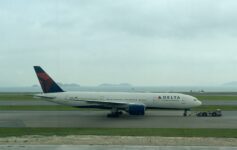Southwest Airlines has reached a preliminary settlement with Boeing over the ongoing 737 MAX grounding. Although the details have not been disclosed, we have some clues.
In announcing a deal with Boeing, Southwest did not share the entire settlement amount, but did promise to share $125 million of it with employees as part of its annual profit-sharing distribution.
As Southwest CEO Gary Kelly explained:
“This profitsharing award is based on the projected financial damages for annual 2019 due to the MAX groundings, just as if you had earned profitsharing on those projected profits this year.”
Southwest also shared that it “expects” a discount on current and future aircraft orders due the MAX grounding.
In a statement, Southwest expressed confidence in the 737 MAX program, something that may have been a required element of any settlement package.
“Southwest Airlines continues to monitor information from Boeing and the FAA on the impending 737 MAX software enhancements and training requirements. The airline remains confident that, once certified by the FAA, the enhancements will support a safe return of the 737 MAX aircraft.”
Deals of this nature are generally protected by confidentiality agreements, to an extent to which disclosures may lead to a forfeit of the entire settlement agreement. Thus, I’d be surprised if the full details leak out on a short-term basis.
CONCLUSION
This compensation award to Southwest Airlines is merely a first round. The 737 MAX ban remains in effect and may extend further into 2020.
Federal Aviation Administrator Steve Dickson recently wrote he “is concerned that Boeing continues to pursue a return-to-service schedule that is not realistic” and has taken a harsh stance against Boeing. With the MAX disaster also discrediting the FAA, expect a scrupulous process before the 737 MAX is cleared to fly again. That will likely mean more compensation for Southwest Airlines and for others airlines.
image: Southwest





I’m curious to know if, and to what extent, carriers knew of the flaws inherent in the 737-Max. If they did, I wouldn’t find it too hard to believe that their bean counters weighed the costs of a lawsuit/settlement from a fatal incident with the cost savings they were receiving on the plane. Plus they could turn around and then sue Boeing for the same. Depending on how long all this goes on and how detrimental it is to the commercial side of Boeing, I’d not be too surprised if leaked documents magically appeared showing AA and WN and others knew of the design problems but pressed on after some cost-benefit analysis. Clearly all conjecture, but given how incestuous the industry is, to include its regulators, it’s hard to imagine there wasn’t internal talk.